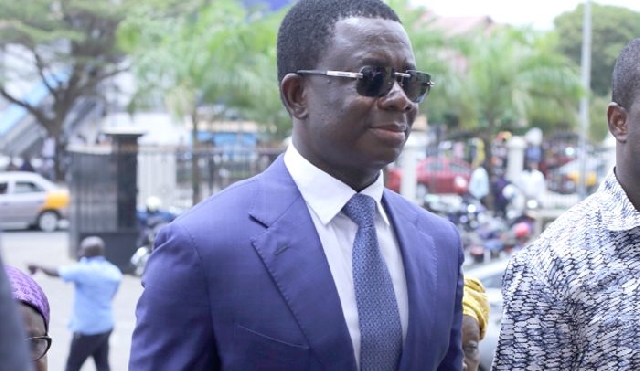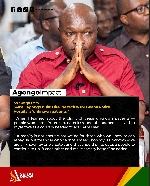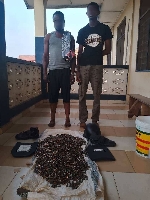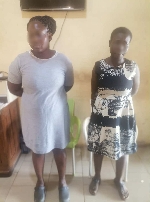Testing lithovit fertiliser in wrong lab: Standards Authority exposes prosecution in COCOBOD trial
 Stephen Opuni
Stephen Opuni
The Accra High Court hearing the trial of former COCOBOD boss and two others, have been told that a test result on lithovit liquid fertilizer tendered in evidence by the prosecution was done at a wrong laboratory.
As a result of the incorrect laboratory testing, the report failed to come out with the full spectrum of parameters to be analysed for fertilizers, hence the test’s verdict that lithovit was an ineffective fertilizer, the court learnt.
However, state prosecutors have relied heavily on this test report which credibility has now been questioned to buttress the long-held claim that lithovit liquid fertilizer is a worthless product.
It has been the case of the state that lithovit fertilizer was substandard, and that the state did not get value for money when COCOBOD purchased it between 2014 and 2016, leading to a charge of causing financial loss to the state being levelled against the accused persons.
But Mrs. Genevieve Baah Mante, Head of the Material Science Department at the Ghana Standard Authority (GSA), on June 13, 2024, revealed the significant procedural error in the testing of Lithovit liquid fertilizer at the Drugs, Cosmetic and Forensic laboratory.
The test result can be found on page 105 of Exhibit H, which is the Adu-Ampomah Committee report, and the court has learnt that the Drugs, Cosmetic and Forensic laboratory under the Testing Department of GSA deals with narcotics, pharmaceuticals and cosmetics as well as medical devices including condoms.
Mrs. Baah Mante, a subpoenaed witness, has been testifying in the ongoing trial of former Chief Executive of COCOBOD, Dr. Stephen Opuni and businessman Seidu Agongo as well as Agricult Ghana Limited, producers of lithovit liquid fertilizer, who have been facing 27 charges, including defrauding by false pretences, willfully causing financial loss to the state, corruption by public officers and contravention of the Public Procurement Act in the purchase of Lithovit Liquid Fertilizer.
The court presided over by Justice Aboagye Tandoh was informed that a meeting was held in the office of former Senior Minister Yaw Osafo Marfo to address discrepancies involving three test results including the one the witness admits was tested at the wrong lab. Two of the tests were conducted at the GSA, whilst the other one, which credibility is also in doubt, was done at the Chemistry Department of the University of Ghana.
The witness also informed the court that despite extensive discussions, the meeting did not resolve the conflicting test results, prompting scientists who analysed the test results to recommend to Mr. Osafo Marfo to allow the team to conduct another test or take a sample abroad to test for the efficacy or otherwise of lithovit liquid fertilizer. There is, however, no record that the advice from the experts were adhered to, the witness told the court.
Surprisingly, despite having full knowledge of the existence of the three laboratory test results, the Adu-Ampomah committee’s report conveniently excluded the second GSA report that defence counsel say does not support the case currently being prosecuted in court.
The excluded test result conducted at the General Chemistry laboratory of the Standards Authority confirmed the efficacy of lithovit liquid fertilizer in 2017, which is at the centre of the trial.
Dr. Yaw Adu-Ampomah who chaired that committee also testified in court as the third prosecution witness, but never mentioned the existence of that second test result which confirmed lithovit as a fertilizer.
Interestingly, the CID investigator, Chief Inspector Thomas Prempeh Mercer when he appeared in court, as the seventh prosecution witness, claimed he was not aware of the existence of the second test from GSA, although the case docket handing over the investigations from EOCO to the police captured the fact that the second test was available.
It took Mr. Paul Agyei Gyang, the then Head of Organised Crime Unit at EOCO, who was actively involved in the testing of the three tests, to apprise the court of the fact that the docket his outfit handed over to the police CID included the second test result from GSA, contrary to what the investigator told the court.
“I would be right in suggesting to you that when Mr. Quartey-Papafio (analyst of the first GSA test) was given this product to test on whether it was fertilizer in April 2017, what he should have done was to have referred it to the competent department and not to have conducted the test himself in his division,” counsel for Dr. Opuni, Samuel Codjoe asked Mrs. Mante.
The witness agreed and replied, “Yes”.
“So then it would be a truism that if a product for testing is not submitted to the proper department in the Ghana Standard Authority for testing, it is possible to have a wrong finding as happened in this case. That is one reason?” she was asked.
The witness replied, “It is possible some discussions ensued between Quartey-Papafio and the officials of EOCO before he accepted to conduct the analysis because the report from Quartey-Papafio has only three parameters which does not represent the full spectrum of parameters to be analysed for fertilizers.”
She however said she cannot tell if the reason why Quartey-Papafio’s report has only three parameters was because that was what EOCO requested.
Mrs. Baah Mante also confirmed that Mr. Quartey-Papafio and his colleague Janet Aidoo who conducted the first test at the wrong lab, “agreed and or accepted”, during the meeting in Osafo Marfo’s office, that the requisite department to conduct the test of the fertilizer was the Material Science department under which the General Chemistry lab is.
The implications of testing the fertilizer in the wrong lab were underscored when it was noted that improper sample handling could lead to inaccurate results due to factors like temperature, sunlight, and packaging. The witness acknowledged, “Yes,” when asked if expired, adulterated, or improperly stored samples could result in wrong analysis.
During the court proceedings, the witness provided detailed testimony about the standards and procedures for fertilizer testing at Ghana Standards Authority.
Importantly, the GSA laboratories are internationally accredited, with the witness affirming, “Our laboratories are accredited so our test results are accepted worldwide.” This accreditation underscores the credibility and acceptance of the GSA's testing results.
Source: classfmonline.com
Trending News

Okudzeto-Ablakwa inaugurates smart classrooms to boost STEM education in North Tongu
11:38
Activist Felicity Nelson brings Christmas comfort to Accra Police cells
08:32
First batch of large-scale mining licences to face possible revocation revealed
09:08
A/R: Kumawu MP celebrates Christmas with drivers and Okada riders
07:57
Alhaji Agongo builds lifeline facility for Ghana Police Hospital’s ‘unknown patients’
09:55
IGP Special Operations Team arrests suspect in Kpalsi over suspected Indian Hemp
07:48
Police arrest 2 suspects for unlawful possession of ammunitions
10:06
Kumawu MP shares Christmas with aged, widows in Constituency
07:39
PRINPAG President loses father
08:26
WN/R: Two school staff members arrested for theft of students' food items at Sefwi Bekwai
02:13




